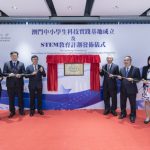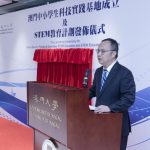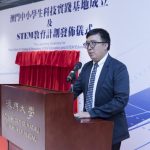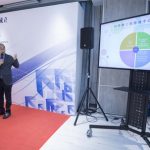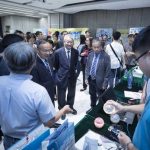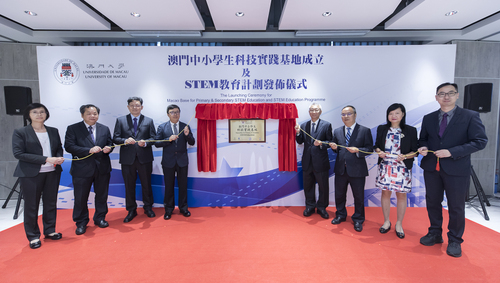 The inauguration ceremony for the Macao Base for Primary & Secondary STEM Education
The inauguration ceremony for the Macao Base for Primary & Secondary STEM Education
The University of Macau (UM) today (28 June) held an inauguration ceremony for the Macao Base for Primary & Secondary STEM Education and an opening ceremony for the STEM Programme, which attracted many prominent community members, teachers and students from local secondary schools, and parents. With UM’s centre for science and engineering promotion as the core component, the base will launch a series of STEM programmes to support science promotion in Macao and provide continuous training for teachers and students from local secondary schools. The base will also advance science promotion in Macao by collaborating with all strata of society.
Officiating guests at the inauguration ceremony included Lam Kam Seng, chair of UM’s University Council; Ma Chi Ngai, president of the Administrative Committee of the Science and Technology Development Fund (FDCT); Yonghua Song, rector of UM; Lou Pak Sang, director of the Education and Youth Affairs Bureau; Ho Sio Kam, president of the Chinese Educators Association of Macau; Kolbe Vong, director general of the Macao Catholic Schools Association; Sio Hon Pan, curator of the Macao Science Center; and Van Mei Lin, deputy director of the Macao Post and Telecommunications Bureau. Other guests at the ceremony included Hu Cong, assistant director-general of the Economic Affairs Department of the Liaison Office of the Central People's Government in Macao; Chan Wan Hei, member of the Administrative Committee of the FDCT; Lionel Ni and Rui Martins, vice rectors of UM; Yuen Ka-Veng, interim dean of UM’s Faculty of Science and Technology (FST) and registrar; Tam Kam Weng, associate dean of the FST and director of the centre for science and engineering promotion; as well as professors, supervisors, and secondary school principals.
In his speech, Rector Song said he remembers President Xi Jinping’s expectation for UM to produce more talented graduates with a love for the country and Macao as well as more achievements in science and technology. To fulfill the expectation, the university will create various new platforms for local students to develop their talents. For instance, last year, Lou Wan-Ian, a student from the Sacred Heart Canossian College English Section, was selected to study at UM’s Wireless Communication Laboratory through a talent development programme jointly launched by UM and the FDCT. Later, she visited the United States as a member of a research delegation from UM and won the championship at the IEEE Mega-Challenge 2017: Smart Cities Competition, which was part of the IEEE RFID 2017 Conference. In the future, UM will continue to encourage young adults in Macao to make a contribution to the development of Macao and the Greater Bay Area.
In his speech, Ma Chi Ngai said that in President Xi Jinping’s letter addressed to all teachers and students from institutions of higher learning in Macao, he recognised Macao’s new progress in technological innovation and encouraged Macao to create more achievements in science and technology so as to promote the moderate diversification of Macao’s economy, the sustainable development of the city, and the development of the Greater Bay Area. The FDCT will follow President Xi’s instructions. It will support science promotion in Macao, and encourage young adults in Macao to study science-related subjects and participate in scientific research, so as to create a pool of talented people for technological upgrading in the future.
Tam Kam Weng reviewed the various science promotion activities organised by the FST over the years. This is the 11th consecutive year that UM has organised the science promotion summer camps. In addition to the science promotion summer camps, UM has also organised talent development programmes, training sessions for students participating in competitions, and teacher training, with the aim of training talented people for Macao. In the future, they will further strengthen communication and collaboration with domestic and international institutions through the base. For the 2018-2019 period, the centre will launch science promotion outreach programmes, through which UM professors and students will organise science promotion activities in the local community.
At the event, an opening ceremony for a training workshop in technological innovation for primary and secondary school teachers, and an opening ceremony for a science promotion summer camp, were also held. The two events are part of UM’s STEM Programme for the year 2018. This year’s training workshop in technological innovation has attracted more than 60 teachers. Ten professors from UM’s FST will introduce students to the latest research and applications in their areas of expertise. The workshop will not only help to strengthen communication between secondary school teachers and the Macao Base for Primary & Secondary STEM Education, it will also help to inspire new ideas, assist various secondary schools to discover students’ potential in science, encourage science promotion, and make good use of UM’s research resources.
Funded by the FDCT, UM’s science promotion summer camps cover seven topics, namely civil engineering, three-dimensional reconstruction of quadcopters, computer vision and human-machine interaction, wireless technology, robots and artificial intelligence, transport technology, and maths and big data. The summer camps aim to help secondary school students develop an interest in, and discover their potential for, science and technology, and to strengthen their organisational and teamwork skills through interactive games and science experiments.
View gallery

